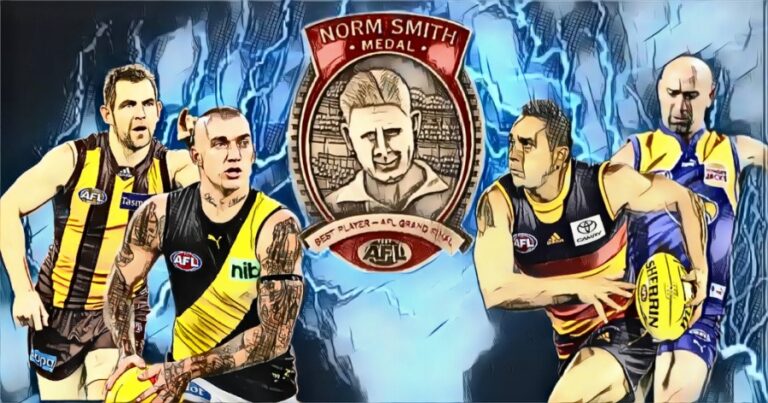Norm Smith Medal
Perhaps the third most coveted individual medal in the game is the Norm Smith Medal, awarded to the player adjudicated as best on ground in the AFL Grand Final. Voted on by a selected panel of five, consisting of former players, commentators and media personnel, each member casts a 3-2-1 vote, with certain caveats in place to prevent any chance of a tie. The medal is presented immediately after the conclusion of the Grand Final, and since 2004 this has been traditionally awarded by a former medal recipient.
But who exactly was Norm Smith? Legendary coach? Legendary player? All of the above and more.
One of the most awarded and successful players and coaches to ever be involved in Australian rules football, Norm Smith transcended to become one of the biggest identities in the game, and is still remembered as so to this day.
Even just simply rattling off his accomplishments is enough to leave the average pundit amazed. Four premierships as a player, an equal four time club leading goal kicker, a further six premierships as a coach, captain of both clubs that he played for, coach of both the AFL’s and Melbourne Football Club’s Teams of the Century, and a rightful legend in both the AFL and Melbourne’s Hall of Fames.
The story of Norm Smith has humble beginnings, growing up as a gifted sportsman of both football and cricket, It was actually his older brother Len that the Melbourne Football Club initially set out to recruit. After a visit to the Smith household, Norm’s father suggested that the club ought to give both of his boys a chance together. As turned out to be the case, Norm would go on to become one of the biggest names in the sport, whilst his brother Len would play two seasons at Melbourne before finishing his playing career with a seven year stint at Fitzroy, and eventually transitioning into coaching.
In 1935, the younger Smith would make his senior debut under Frank ‘Checker’ Hughes – a coach whose legendary achievements at the Melbourne Football Club would eventually be overtaken by one man – Norm Smith. Earning a reputation in the papers as a selfless player who always found the best in his teammates, Smith developed a football brain that rivalled some of the best coaches and players of the time. He earned the fitting nickname ‘The Red Fox’ for his brushed-back, flowing and glowing red hair, paired with his dashing playing style.
Under the tutelage of Hughes, Smith would play a pivotal role in guiding the Red Demons (as they were then referred to) to three successive premierships from 1939-1941, then again in 1948 after a Grand Final defeat in 1946.
Norm Smith’s exploits on the field are usually recalled as being those of the highest smarts. Often acknowledged as a premier strategist, his knack for thinking outside of the box and changing tactics and positions around on the field were then considered out of the ordinary in his era, but something that peers and players of future generations would soon look to emulate in their own games.
As if all of that wasn’t enough, now we cover the transition into coaching.
Once the decision was made by his four time premiership coach, ‘Checker’ Hughes, to retire at the top of his game after the 1948 Grand Final win, Smith threw his hat in the ring to take over as Melbourne’s coach for the 1949 season, but disappointingly lost out by one single vote, in a committee decision to award the position to Melbourne’s former premiership captain Allan LaFontaine.
Eager to begin his coaching career, Smith made the heartbreaking decision to transfer to Fitzroy, where he would rejoin his brother Len (Under-19’s coach) as a captain-coach for 17 games, before ultimately deciding to hang up the footy boots and assume duties as standalone coach for the 1951 season.
Smith’s time as coach of Fitzroy was competitive, but the side never made finals. Meanwhile, the man who pipped him at the post, LaFontaine, was battling away rather unsuccessfully back at Melbourne, only lasting three seasons at the helm before a resignation that would see Norm Smith return to his spiritual home of Melbourne, where a true dynasty in every sense of the word would begin.
Some credit an overhaul of the club and recruiting, others credit Smith’s new and unconventional-in-comparison method to coaching, but one thing is for certain – Melbourne became a juggernaut of the competition, and set numerous records as one of the most dominant outfits the game had ever seen.
A decade of destruction saw the Demons win six Grand Finals under the coaching direction of Smith (1955-1957, 1959-1960 and 1964). Now recognised as one of the greatest coaches of all time, Smith was a disciplinarian of the highest order, colloquially known as the ‘Demon Dictator’, he united his players and taught them a style of comraderie that became the envy of the competition.
Periodicals of the time credit Norm Smith and his coaching team with implementing a contemporary, run-and-gun style of play that encouraged playing on at all costs and rewarded the elite fitness he demanded of his players, with the Demons credited as being able to outrun and outlast their opposition counterparts, and boasting an exuberant confidence in the way that they played.
Before the Kennett Curse, before the Hardwick Hoodoo®, you may have heard of the Norm Smith Curse at Melbourne. This fabled curse found its roots in 1964, when Smith’s temper and penchant for easily losing his cool (traits that I only found mentioned in that latter stages of his coaching career) came to a front, when the six-time premiership coach had an intense falling out with several key power brokers and influential figures behind the scenes at the Melbourne Football Club.
These quarrels came to a massive head when another legendary Melbourne name that you may have heard of – Ronald Dale Barassi, decided to move to rival Carlton as captain-coach.
A brief history between Barassi and Smith – by the time Ron Barassi joined the Demons in 1953, he had already lived with Norm Smith and his wife for almost three years, moving in with them as a 15 year old. Smith and Barassi had a terrific, functioning relationship as coach and player, but despite Smith’s ambition of a coaching ‘succession plan’ of sorts, between he and Barassi, eventually wanting to hand the Melbourne coaching reins over to his young protege, Barassi’s desire was to coach Carlton – a move that Smith surprisingly supported and endorsed.
Barassi ultimately rejected each of Melbourne’s offers, and the support given by Smith was not taken well by those at the Melbourne Football Club, most of whom accused Smith of ridding himself of his greatest coaching rival.
These tensions continued and the demeanour of Smith reportedly changed. His once staunch character is said to have become easily heated and became heavily reported as having a dastardly acid tongue – a character transition that would see Smith in legal trouble, after some choice comments led to the coach being sued by an umpire for defamation, a charge that those at the Demons refused to support Smith in defending.
The entire powder keg of a situation ignited midseason in 1965, when on a Friday evening prior to Melbourne’s Round 13 match, a courier delivered a letter of termination to Smith at his residence. The news was leaked to the media and the subsequent hysteria around the entire situation became the largest and most reported-on scandal to date in the entire Australian football landscape.
A rare television appearance from Smith won him the support of the wider footballing community, and speculation ran rife that he would go on to replace his older brother (who was suffering through illness at the time) as coach of Richmond.
The Melbourne Football Club baulked at the external backlash, and reinstated Smith within a week of his dismissal, but the damage had well and truly set in. The subsequent turmoil caused irreparable damage to the Melbourne team, as a once watertight unit began to erode. The Demons only managed one more win for the season, missing finals for the first time in eleven seasons.
So where does the curse come into things? Well, after a further two disappointing seasons where Melbourne continued their steady decline, Smith would resign as coach at the conclusion of the 1967 season. The Demons wouldn’t make another finals appearance for 20 years (1987), and wouldn’t win another Grand Final until their drought-breaking victory in 2021, a measly 57 years later.
Norm Smith went on to coach South Melbourne for three seasons, where he achieved what many say to be one of the greatest examples of his coaching prowess throughout his career, and that was taking the meagre Swans from the lower echelons of the ladder to a genuine finals contender overnight. Making the club’s first finals appearance in 25 years. The lack of funding and resources at the club led to a drastic decline, and Smith would resign two years later.
In 1979, only six years after his untimely death at age 57 (suspiciously, the same age of ‘the curse of Norm Smith’ before it was ended in 2021), the VFL commissioned the Norm Smith Medal, named in honour of the League’s coach of their Team of the Century, and championed as an award for the best player on Grand Final day – an occasion that Smith himself excelled in above all others as both player and coach.
Like this free content? You could buy Jimmy a beer, or a coffee, or something to trim his nasal hair as a way to say thanks. He’ll be a happy camper.


